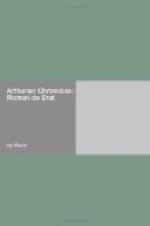|
This section contains 5,250 words (approx. 18 pages at 300 words per page) |

|
SOURCE: Sturm-Maddox, Sara. “‘Tenir sa terre en pais’: Social Order in the Brut and the Conte del Graal.” Studies in Philology LXXXI, no. 1 (winter 1984): 28-41.
In the following essay, Sturm-Maddox argues that Chretien de Troyes' reading of Wace's Brut influenced his elevation of social concerns over individual chivalric values in his version of the grail story.
In the wake of recent demonstrations that the traditional criteria of veracity versus fictionality are not universally pertinent to the classification of medieval narrative,1 the question of generic differentiation acquires new prominence. The conventional distinction, of course, has its twelfth-century antecedent in Jehan Bodel's often-cited enumeration of three matières:
N'en sont que trois materes à nul home entendant: De France et de Bretaigne et de Rome la Grant; Ne de ces trois materes n'i à nule samblant. Li conte de Bretaigne s'il sont vain et plaisant Et cil de Romme sage et de...
|
This section contains 5,250 words (approx. 18 pages at 300 words per page) |

|


